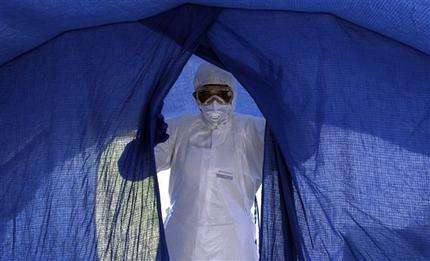WHO: Ebola Transmission 'Intense' in Sierra Leone
 The spread of Ebola remains "intense" in most of Sierra Leone even as things have improved somewhat in the two other countries hardest hit, the World Health Organization says.
The spread of Ebola remains "intense" in most of Sierra Leone even as things have improved somewhat in the two other countries hardest hit, the World Health Organization says.Some 168 new confirmed cases emerged in a single week in Sierra Leone's capital of Freetown recently, according to a WHO report.
"The numbers are still rising and the transmission is persistent and widespread," said Amadu Kamara, the U.N.'s Ebola crisis manager in Sierra Leone. "Rapid and coordinated response are needed to overcome the spread of the Ebola disease."
The WHO report released late Wednesday indicated that Sierra Leone had the lowest percentage of Ebola patients who had been isolated - only 13 percent. By comparison, that figure was 72 percent in Guinea.
The disease is spread through direct physical contact with the bodily fluids of sick people and bodies, making it crucial that those who are contagious are placed into isolation.
Health officials are aiming to isolate at least 70 percent of the sick, a target Kamara acknowledged was still far out of reach.
"Progress is slow and we are falling short, and we need to accelerate our efforts," he said.
WHO has said that at least 1,250 people, including seven of the country's doctors, have died in Sierra Leone since the outbreak there began earlier this year.
Ebola is blamed for more than 5,400 deaths in Sierra Leone, Liberia and Guinea.
By comparison, the report said cases appear "to have stabilized" over the last four weeks in Liberia. Still, Liberian President Ellen Johnson Sirleaf warned people to keep up their vigilance even though she said the country now has "the upper hand."
"Our government remains concerned that progress in this battle will lead to complacency on the part of the international community," she said Wednesday. "It must be remembered that although in Monrovia we are witnessing improvements, we continue to see Ebola hotspots throughout rural Liberia. We must, therefore, remain steadfast in our commitment to fight this disease until the very last case."
---
Associated Press writer Jonathan Paye-Layleh in Monrovia, Liberia contributed to this report.